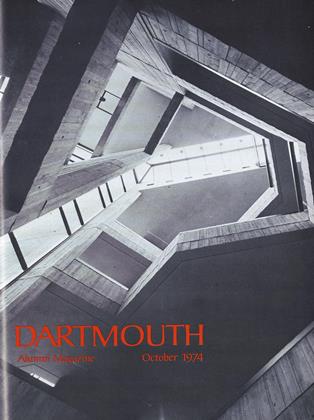PAINTBRUSH, A JOURNAL OF POETRY, TRANSLATIONS, & LETTERS, Spring 1974
October 1974 CLAUDE G. LIMAN '65PAINTBRUSH, A JOURNAL OF POETRY, TRANSLATIONS, & LETTERS, Spring 1974 CLAUDE G. LIMAN '65 October 1974
Edited by B. M. Bennani '68. Laramie (Wyo.): Ishtar Publications, 1974. 65 pp. $2.
In times of inflation, guns and butter demand everyone's attention. And poetry journals? Never in very wide demand, they are always dying off, particularly during periods when many so-called "essentials" are also threatened. This is scarcely a propitious time to launch a new poetry journal; Badreddine M. Bennani is therefore to be congratulated not only for the birth of Paintbrush but also for the sturdiness of the newcomer as well.
Paintbrush is beautifully laid out, handsomely printed. And, fortunately, its literary quality matches the excellence of the journal's appearance.
For this premier issue, Bennani has enlisted the support of some of America's premier poets. William Stafford, Robert Bly, Howard McCord, James Tate, Robert Creeley, and Richard Hugo are all well known, and rightly so. Dartmouth's own Richard Eberhart '26 is even better known, and this first issue of Paintbrush is fittingly dedicated to him, to this "mentor, father, and friend on his seventieth birthday." Richard Hugo's warm tribute, "For Richard Eberhart at Seventy," leads off the issue, followed by Eberhart's own ambitiously rhymed acrostic, "A Telling."
In addition to Eberhart, Bennani has called on other Dartmouth friends for contributions. English Professor Thomas Vance and his wife Vera are represented by their individual poems and by their joint translations of the work of two Swedish poets. Anselm Parlatore, Granite editor, has two short poems here, and Robert Pack '51, Professor of English at Middlebury and director of the Bread Loaf Writers Conference, contributes two longer ones.
A poetry journal need not try for any organic unity of theme or style - in fact, a diversity of excellence is what most journals normally try for, and what Paintbrush succeeds in reaching. Nevertheless, I might mention a striking resemblance between Thomas Vance's "Entrance" and Robert Pack's "I Cannot Stop." In both poems, the poets are concerned with the need for another eye, for an other's ear, to help them translate the "otherness" of the world. Both poets resort to puns to capture the multilayered meanings of experience. Pack asks his other (wife? nature?) to give him "the words for those stopped sounds you've seen," thereby mixing sight and sound imagery and making a pun on "stopped:" sounds that have ceased and sounds that are produced, musically, by the process of stopping. Vance, also, is denied entrance to the experience of his other. Only in the Donne-like use of his own reflected image in the beloved's eye (and in the Donne-like use of puns) does he come close to the mystery of how we process what we see, and of how we are processed when seen.
Paintbrush is visually pleasing and poetically sound. I wish it a longer lifetime than that enjoyed by most of its brethren.
Mr. Liman is an Assistant Professor atLakehead University in Thunder Bay, Ontario,where he teaches American literature andcreative writing.
 View Full Issue
View Full Issue
More From This Issue
-
 Feature
Feature"THE KINGDOM OF GOD HAS COME"
October 1974 By MARy BISHOP ROSS -
 Feature
FeatureMore than a beast, Less than an angel
October 1974 By PETER A. BIEN -
 Feature
FeatureMountain of Storms
October 1974 By ANDREW HARVARD, TODD THOMPSON -
 Feature
FeatureBelieve It or Not!
October 1974 By GREGORY C. SCHWARZ -
 Article
ArticleBig Green Teams
October 1974 By JACK DEGANGE -
 Class Notes
Class Notes1923
October 1974 By WALTER C. DODGE, DR. THEODORE MINER
CLAUDE G. LIMAN '65
Books
-
 Books
BooksFACULTY PUBLICATIONS
August 1924 -
 Books
BooksRICHARD HENRY DANA.
MARCH 1970 By CARL E. MAVES '63 -
 Books
BooksNEUROLOGY of the OCULAR MUSCLES
May 1948 By Hanford L. Auten '32. -
 Books
BooksBOLIVAR
November 1941 By Herbert F. West '22 -
 Books
BooksDemystifying the Crisis
MARCH 1982 By Leonard L. Glass '64 -
 Books
BooksTHE SONG OF THE NIBELUNGS.
DECEMBER 1962 By WILLIAM C. CALIN



